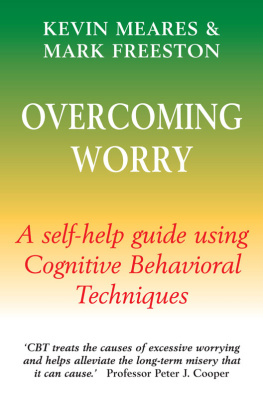Kevin Meares - Overcoming Worry
Here you can read online Kevin Meares - Overcoming Worry full text of the book (entire story) in english for free. Download pdf and epub, get meaning, cover and reviews about this ebook. year: 2008, publisher: Robinson, genre: Science. Description of the work, (preface) as well as reviews are available. Best literature library LitArk.com created for fans of good reading and offers a wide selection of genres:
Romance novel
Science fiction
Adventure
Detective
Science
History
Home and family
Prose
Art
Politics
Computer
Non-fiction
Religion
Business
Children
Humor
Choose a favorite category and find really read worthwhile books. Enjoy immersion in the world of imagination, feel the emotions of the characters or learn something new for yourself, make an fascinating discovery.
- Book:Overcoming Worry
- Author:
- Publisher:Robinson
- Genre:
- Year:2008
- Rating:3 / 5
- Favourites:Add to favourites
- Your mark:
- 60
- 1
- 2
- 3
- 4
- 5
Overcoming Worry: summary, description and annotation
We offer to read an annotation, description, summary or preface (depends on what the author of the book "Overcoming Worry" wrote himself). If you haven't found the necessary information about the book — write in the comments, we will try to find it.
Overcoming Worry — read online for free the complete book (whole text) full work
Below is the text of the book, divided by pages. System saving the place of the last page read, allows you to conveniently read the book "Overcoming Worry" online for free, without having to search again every time where you left off. Put a bookmark, and you can go to the page where you finished reading at any time.
Font size:
Interval:
Bookmark:
Dr Kevin Meares is a consultant clinical psychologist and a cognitive-behavioral therapist. He works for the NHS at the Newcastle Cognitive and Behavioural Therapy Centre offering therapy to adults with a range of psychological problems, specializing in anxiety disorders. He supervises trainee clinical psychologists and cognitive therapists. He is an experienced trainer, regularly leading workshops on CBT. His research interests focus on rumination and worry and he has a particular interest in post-traumatic stress disorder.
Professor Mark Freeston is the Director of Research and Training at the Newcastle Cognitive and Behavioural Therapies Centre and Honorary Professor of Clinical Psychology at the University of Durham. He is also Professor of Clinical Psychology at the University of Newcastle. He divides his time between NHS duties, where he directs the Newcastle Diploma in Cognitive Therapy, and the University of Newcastle. He has published over 80 papers, mainly in the field of intrusive thoughts and worry and on the formulation and treatment of Obsessive Compulsive Disorder and Generalized Anxiety Disorder. He regularly provides workshops on the cognitive behavioral treatment of these disorders. He chaired the Guideline Development Group for OCD and BDD for the National Institute of Clinical Excellence (NICE) from 2003 to 2005.
The aim of the Overcoming series is to enable people with a range of common problems and disorders to take control of their own recovery program. Each title, with its specially tailored program, is devised by a practising clinician using the latest techniques of cognitive behavioral therapy techniques which have been shown to be highly effective in changing the way patients think about themselves and their problems.
The series was initiated in 1993 by Peter Cooper, Professor of Psychology at Reading University and Research Fellow at the University of Cambridge in the UK whose original volume on overcoming bulimia nervosa and binge-eating continues to help many people in the USA, the UK and Europe. Many books in the Overcoming series are recommended by the UK Department of Health under the Books on Prescription scheme.
Other titles in the series include:
OVERCOMING ANGER AND IRRITABILITY
OVERCOMING ANOREXIA NERVOSA
OVERCOMING ANXIETY
BULIMIA NERVOSA AND BINGE-EATING
OVERCOMING CHILDHOOD TRAUMA
OVERCOMING CHRONIC FATIGUE
OVERCOMING CHRONIC PAIN
OVERCOMING COMPULSIVE GAMBLING
OVERCOMING DEPERSONALIZATON AND FEELINGS OF UNREALITY
OVERCOMING DEPRESSION
OVERCOMING GRIEF
OVERCOMING INSOMNIA AND SLEEP PROBLEMS
OVERCOMING LOW SELF-ESTEEM
OVERCOMING MOOD SWINGS
OVERCOMING OBSESSIVE COMPULSIVE DISORDER
OVERCOMING PANIC
OVERCOMING PARANOID AND SUSPICIOUS THOUGHTS
OVERCOMING PROBLEM DRINKING
OVERCOMING RELATIONSHIP PROBLEMS
OVERCOMING SEXUAL PROBLEMS
OVERCOMING SOCIAL ANXIETY AND SHYNESS
OVERCOMING TRAUMATIC STRESS
OVERCOMING WEIGHT PROBLEMS
OVERCOMING YOUR CHILDS FEARS AND WORRIES
OVERCOMING YOUR CHILDS SHYNESS AND SOCIAL ANXIETY
OVERCOMING YOUR SMOKING HABIT
All titles in the series are available by mail order.
Please see the order form at the back of this book.
www.overcoming.co.uk
A self-help guide using
Cognitive Behavioral Techniques
KEVIN MEARES
AND
MARK FREESTON
ROBINSON
London
Constable & Robinson Ltd
5556 Russell Square
London WC1B 4HP
www.constablerobinson.com
First published in the UK by Robinson,
an imprint of Constable & Robinson Ltd 2008
Copyright Kevin Meares and Mark Freeston, 2008
The right of Kevin Meares and Mark Freeston to be identified as the authors of this work has been asserted by them in accordance with the Copyright, Designs and Patents Act, 1988.
All rights reserved. This book is sold subject to the condition that it shall not, by way of trade or otherwise, be lent, re-sold, hired out or otherwise circulated in any form of binding or cover other than that in which it is published and without a similar condition including this condition being imposed on the subsequent purchaser.
A copy of the British Library Cataloguing in Publication Data is available from the British Library.
Important Note
This book is not intended as a substitute for medical advice or treatment. Any person with a condition requiring medical attention should consult a qualified medical practitioner or suitable therapist.
ISBN 978-1-84529-636-0
eISBN 978-1-47210-582-0
Printed and bound in the EU
1 3 5 7 9 10 8 6 4 2
Dedicated to the memory of Jose Charbonneau 19602007
We owe an incalculable debt of gratitude to the individuals we encountered in our clinical work who suffered with excessive worry; their collective experience is the principal source for this book. As this is a self-help book we have limited the number of references to research but acknowledge that the information is based on the silent yet generous contribution of many. We would like to thank all of those who have contributed to the pool of knowledge from which we have drawn. With this in mind we would like to thank all those who contributed to the program of research at lUniversit Laval, leading to the development of the model of Generalized Anxiety Disorder that forms the foundation for this book. We would especially like to thank Robert Ladouceur, Michel Dugas and Eliane Lger.
We thank all our colleagues at the Newcastle Cognitive and Behavioural Therapy Centre for their good humour, support and friendship, with special thanks to Dr Stephen Barton, for his generosity with both his time and his ideas particularly related to the chapter on the heart of worry and on goal-setting. Many thanks also to Dr Andrew Wilkinson, Dr Tracy Thorne, Dr Douglas Maisey, Jenny Shannon, Emma Thomas, Carol Thackery, and Dr Jen Lane for their helpful feedback on early drafts. Thanks to Peter Armstrong for many helpful discussions. Thanks to Peter Cooper, Fritha Saunders, Hannah Boursnell and Elizabeth Stone for their expert guidance. Many thanks to Ricky, Debi and Ian at Ellipsis Books for their hard work and commitment. Thanks to Karen Lysakowska, Anita Allinson, Jo Thomas and Jon Chapman for their contributions. In addition, we thank the numerous supervisors, supervisees, trainees and students who have contributed along the way.
Finally we thank our families and friends for putting up with the absences, both physical and mental, the long hours, the late nights and the inevitable worry, both real and hypothetical.
There are an overwhelming number of self-help books about all sorts of problems, so the first point that needs to be addressed is whether this book will be of use to you. Here are some simple questions that may help you answer this:
Have you always been a worrier?
Yes  No
No 
If there is nothing to worry about, do you still find yourself worrying?
Yes  No
No 
Do minor everyday things spiral into major concerns?
Yes  No
No 
Once it starts, is your worry hard to stop?
Next pageFont size:
Interval:
Bookmark:
Similar books «Overcoming Worry»
Look at similar books to Overcoming Worry. We have selected literature similar in name and meaning in the hope of providing readers with more options to find new, interesting, not yet read works.
Discussion, reviews of the book Overcoming Worry and just readers' own opinions. Leave your comments, write what you think about the work, its meaning or the main characters. Specify what exactly you liked and what you didn't like, and why you think so.










